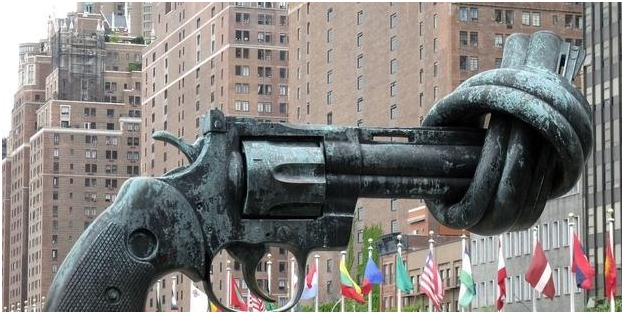UN: Don’t waste historic chance for a lifesaving Arms Trade Treaty

All 193 UN Member States are gathering this week in New York for a final conference on a global Arms Trade Treaty.
It shouldn’t take millions more dying and lives destroyed before leaders show some backbone and take action to adopt global standards to effectively control international arms transfers. They have this historic opportunity to save lives – they need to seize it and stop arms from fuelling atrocities.
Salil Shetty, Amnesty International's Secretary General
Mon, 18/03/2013
The time has come for world leaders to address the poorly regulated global arms trade that fuels grave human rights abuses of tens of millions of people and claims countless lives each year, Amnesty International said today as the Final UN Conference on the Arms Trade Treaty (ATT) opened in New York.
The negotiations from 18-28 March are an opportunity for states to agree rules to end irresponsible arms transfers across borders that fuel grave abuses of human rights. This is an acid test for states to demonstrate their commitment to human rights and humanitarian law.
“Syria, Mali, the Democratic Republic of the Congo and Sri Lanka are just a few recent examples where the world bore witness to the horrific human cost of a reckless global arms trade steeped in secrecy,” said Salil Shetty, Amnesty International's Secretary General.
“It shouldn’t take millions more dying and lives destroyed before leaders show some backbone and take action to adopt global standards to effectively control international arms transfers. They have this historic opportunity to save lives – they need to seize it and stop arms from fuelling atrocities.”
The nine-day ATT conference at the UN follows on from last July when UN negotiations ended without an agreement due to delaying tactics by a handful of states opposed to its goals. In particular, the USA was reluctant to do a deal before the presidential elections. But last November, 157 states voted in favour of returning to the negotiating table this month to finalize the treaty text.
For almost two decades, Amnesty International has been at the forefront of efforts to win a legally binding treaty grounded in international human rights and humanitarian law. Previous attempts before World War Two to forge an arms trade treaty collapsed in part because of the absence of such standards.
Existing UN arms embargoes are only imposed after atrocities have been documented. Because of the lack of agreed systems of regulating arms transfers, they mostly fail to stop the supply of weapons and munitions that continue to fuel atrocities and serious violations of human rights on a massive scale.
That is why it is so important for states to take responsibility for the arms they supply and include a Golden Rule in the treaty. States should assess any proposed transfer to see if there is a substantial risk the arms will be used to commit or facilitate serious human rights violations. If there is such a risk, the transfer should not take place.
“No government or political leader admits publicly that it is acceptable to aid those who commit crimes and human rights abuses – whether in conflict or peacetime – but since the treaty talks began no rule has appeared in the draft texts to prohibit putting arms into the hands of such perpetrators,” said Brian Wood, Amnesty International's Head of Arms Control and Human Rights.
“Around the world, people are now watching this process hoping their political leaders will not fail them – survivors of armed violence and their communities are crying out for a strong Arms Trade Treaty with clear, universal rules for human rights protection at its core.”
In a briefing released last week, Amnesty International singled out the five permanent members of the UN Security Council – China, France, Russia, the UK and the USA – as shouldering the greatest burden in making a strong treaty a reality. They are charged with maintaining international peace and security, yet in 2010 they accounted for approximately 60 per cent of the more than US$70 billion annual trade in conventional weapons. Their economic interests are growing as the trade is expected to reach US$100 billion annually in the next few years.
The long-lasting consequences of this greed can be devastating for women. An Arms Trade Treaty with a clear prohibition against arms transfers which are likely to be used to commit serious violations such as gender-based violence – including sexual violence – would help end the pervasive violence women living in countries such as Democratic Republic of the Congo face on a daily basis.
An Amnesty International delegation with representatives from every world region is at the UN talks and will be pressing leaders to agree to a treaty with arms transfer criteria to ensure respect for international human rights law and robust rules which:
- Strictly regulate all types of conventional arms, including weapons, munitions and other equipment used in both military and law enforcement operations.
- Control all aspects of the international arms trade, including gifts, arms brokering, transporting and financing.
- Establish mechanisms to prevent the diversion of arms transfers to unauthorized end users; to enable public annual reporting; and to criminalize illicit trafficking in arms.
 All 193 UN Member States are gathering this week in New York for a final conference on a global Arms Trade Treaty.
It shouldn’t take millions more dying and lives destroyed before leaders show some backbone and take action to adopt global standards to effectively control international arms transfers. They have this historic opportunity to save lives – they need to seize it and stop arms from fuelling atrocities.
All 193 UN Member States are gathering this week in New York for a final conference on a global Arms Trade Treaty.
It shouldn’t take millions more dying and lives destroyed before leaders show some backbone and take action to adopt global standards to effectively control international arms transfers. They have this historic opportunity to save lives – they need to seize it and stop arms from fuelling atrocities.

